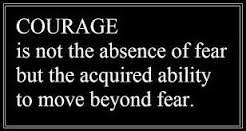“Fear and courage are brothers.” — Unknown
As an executive coach and leadership development practitioner, I am frequently asked, “What is the exact combination of ingredients that form great leaders?” While all ten of the Executive Presence Group’s list of characteristics are extremely important for executive and leadership presence, my belief is that one does stand out more than others. This one leadership characteristic forms the basis for and strengthens all others: Courage.
What is courage? Why is courage important as a leader?
Courage is a trait possessed by all great leaders. This is not about bravado, arrogance, or an overabundance of ego, but the courage necessary to stay the course and to do the right things. It’s the ability to do something that you know is difficult or risky. Standing behind decisions that everyone supports doesn’t require a lot of courage. But standing behind what one believes is the right decision in the face of controversy is what makes greatness.
Some Examples of Courage in the Workplace
It takes courage to:
- not follow everyone else on a decision when you completely disagree
- challenge your boss’ timeframe on a project
- have an uncomfortable conversation to fire someone
- make the tough decision to lay off employees
- admit you made a multi-million dollar mistake with a product redesign
- not allow failure to destroy your confidence
- stand for those not capable of standing for themselves
- remain true to your core values, when entry into a profitable new market is testing your integrity
None of these actions can be done without courage. Courage is having the strength and conviction to do the right thing when it would just be easier to just go along. Demonstrating leadership courage can be difficult, yet it’s precisely the kind of behavior that fosters trust and sets an example for others to follow.
Research indicates that courage is not a personality trait, but a behavior that can be learned. A courageous leader recognizes these teachable moments and then applies what he or she has learned. This conscious action is vital to his or her success. By developing the following ten behaviors, you’ll be better able to call upon your courage when needed.
- Say what needs to be said. Honest conversations can be difficult and uncomfortable, especially if conflict is involved. Having meaningful conversations helps resolve issues. This also means having the courage to put your opinions on the table, even if they are unpopular. Exercise your courageous voice by challenging the status quo, speaking up when someone is putting you down or when gossip is getting out of hand.
- Hold yourself and others accountable. Expect others to perform and deliver on their commitments. Have courage to call them out when they don’t follow through. Remember that accountability begins with you – holding yourself responsible for modeling the behaviors you expect of others.
- Bend, but don’t break. Acting with courage means you have to be resilient. By doing so, you’ll develop a mental capacity that lets you adapt, especially when things don’t go according to your plan. Resilient people bend, but rarely break and in doing so are able to handle most challenges with calmness.
- Embrace failure. Successful people, from Benjamin Franklin to Amelia Earhart to Oprah, are prolific when it comes to failure—they just didn’t let their fear of failing or lack of courage stop them. Failure is part of the process of going after and achieving what you want. Do things you haven’t done before and see things you haven’t seen before. Quite often fear arises out of complacency, because we don’t want to change or move out of our comfort zone.
- Say no. It takes more courage to say no than to say yes. By practicing the art of saying no, you’ll protect yourself from making poor decisions. This skill can help you stay focused, prevent false starts and wrong turns. It will also help you to weed out the people who are not on the same path.
- Don’t fear fear, be brave. Give yourself permission to choose courage so you can navigate your way around, through or over any obstacles that cross your path. When you feel reluctance or fear set in, ask yourself, “What’s the worst thing that can happen if I do this?” Usually the worst never occurs, so take the risk.
Claim Your Courage Today
If courage has eluded you in the past, now is the time to step up. Confront awkward and challenging issues even when your job appears to be at stake. Be vulnerable to admit a mistake. Be authentic to who you are. Create your vision and follow it. Follow a decisive course of action and do what it takes to act courageously.
Answer the question below with two or three things that you can do right away.
What act of courage could greatly enhance your leadership effectiveness if you were to do it?
I consider courage to be the most important attribute of a leader because it forms the foundation for all other leadership qualities. If this is an area that you would like to work on, contact us and let us help you to become more courageous.


Leave a Reply